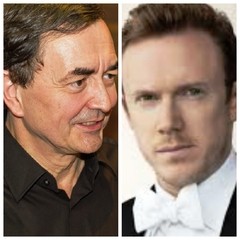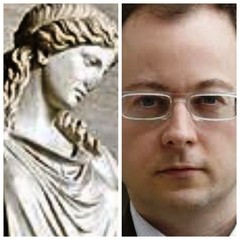|
Back
War (Strauss) and Peace (Connesson) New York
Isaac Stern Auditorium, Carnegie Hall
02/15/2019 - & February 9 (Naples), 13 (Washington), 2019
Guillaume Connesson: Eiréné
Ludwig van Beethoven: Piano Concerto No. 5 in E-flat Major (“Emperor”), Opus 73
Richard Strauss: Ein Heldenleben, Opus 40
Pierre-Laurent Aimard (Pianist)
Royal Concertgebouw Orchestra, Daniel Harding (Conductor)

P.-L. Aimard/D. Harding
“Richard Strauss was the first great realist in music.”
Ernest Newman
Newman didn’t like Strauss very much, so “realism” in music should be a vilification. And happily enough, that onetime 43-year-old wunderkind Daniel Harding didn’t take it too seriously last in night with the Royal Concertgebouw Orchestra.
This was the second performance here of Harding as guest conductor with the orchestra. (Due to...er...questionable behavior Daniel Gatti was let go a few months ago, so they are waiting for a permanent conductor.) This is still a great orchestra of almost unerring perfection, an orchestra which is so good that it cannot be characterized in a single word. We all supposedly know the “sound” of the Berlin or Cleveland or Vienna Phils, but the Amsterdam ensemble could only be called solid, immaculate, their artists execute what their conductors and composers want, and they do it without fuss, with meticulous artistry.
Mr. Harding is as immaculate as they are. Perhaps his players didn’t need those grand gestures, yet they added to the grand playing in the long run. Not perhaps their best grand playing, and I am happy that the two orchestral works last night were not Bruckner or Mahler, which might have been pallid.
Nothing was out of place or idiosyncratic in either the Strauss Heldenleben or a work by French composer Guillaume Connesson. At the same time, the colors were difficult to remember this morning after. And even the Concerto needed an abstraction (“excellent”, “masterly”) rather than a more singular adjective.
Perhaps Pierre-Laurent Aimard has too much greatness as a pianist to give that booming imperial power to the “Emperor” Concerto. Or perhaps his study with Pierre Boulez has led him to seek for the intricacies, the particulars of Beethoven rather than the gestalt wholeness.
No, this was not a fussy Beethoven. No Gallic nuances or subtle seasonings. Mr. Aimard is too fine an artist for that. In fact, the rolling piano introduction had a richness which promised an equally rich performance.
Instead, Mr. Aimard produced a façade of greatness. One could not fault those endless octaves, the nobility of the first-movement themes. One could empathize with the second movement solemnity and could internally smile at the Beethoven humor in the Rondo Allegro.
This was a more than respectable Fifth Concerto, played by a first-rank pianist, since Mr. Aimard’s understanding of music from every century is amongst the admirable in any concert hall. Nor do I doubt the pianist’s cerebral vision of Beethoven’s own conception. Yet personally, I wanted something more than a tidy, suitably heroic performance. No word comes to mind, but perhaps these ears were listening for something less inevitable, more urgent.
Mr. Harding and the Royal Concertgebouw Orchestra were at their urgent best in Richard Strauss’s purposely autobiographical Hero’s Life, conveying Ernest Newman’s “Realistic” flavor. Which leads to a certain guilt.
Heldenleben with the Sinfonia domestica and Alpine Symphony are analogous to a box of Belgian Chocolate Truffles I received for Valentine’s Day. They were delicious as sin, their inner and outer coatings as injurious to the body as their pleasure was healthy for the soul. Simultaneously, how could anybody possibly resist such flavors, such spicy sweetness?
As in Heldenleben.
Music is a different language, it isn’t verbal “realism.” Yes, Telemann composed realism as a joke, Beethoven momentarily imitated Janissary bands. But Strauss was the literal realist. His offstage trumpets were the enemy approaching, his hero’s “works of peace” were his own past compositions, his wife’s imprecations were duplicated in a solo violin. And instead of implying his contempt for the critic Doktor Derhing, he literally spoke the name with a pair of tubas!
Yet, like the Belgian truffles, the music is absolutely irresistible. His war scene is ferocious, the violin solo is as gooey as chocolate. And the last notes of Heldenleben are as emotionally affecting as any finale.
Mr. Harding didn’t read this as story-telling. Until the last two sections, he conducted with a speed, a volatility, an almost inflamed insistence. The conductor relaxed fractionally to allow Concertmaster Liviu Prunaru’s violin portrait of Strauss’s wife. My score has the composer describing her as “nagging” amongst other adjectives. It was a oil painting, even if the oils were sometimes rancid.
As for that finale, this was the Royal Concertgebouw Orchestra at its most glorious, most resplendent. If a concert must have an apogee, this was it.

Roman reproduction of Greek Eiréné/G. Connesson
The opening was a New York premiere of French composer Guillaume Connesson’s Eiréné (The Greek/Roman goddess Irene.) Within its mere ten-minutes, Mr. Connesson had created a tri-sectioned work of quietly whirling strings, of anthems and chorales, a work which breathed conservative harmonies, fragilities and crystalline colors. One imagines that, had Debussy lived another few decades after his Jeux, he might have written such a work. Except that Debussy was always several spheres above his titles. Mr. Connesson’s paean to the Goddess of Peace, with a dedicated performance, had the flow of nature, and a muted song of the earth.
Harry Rolnick
|